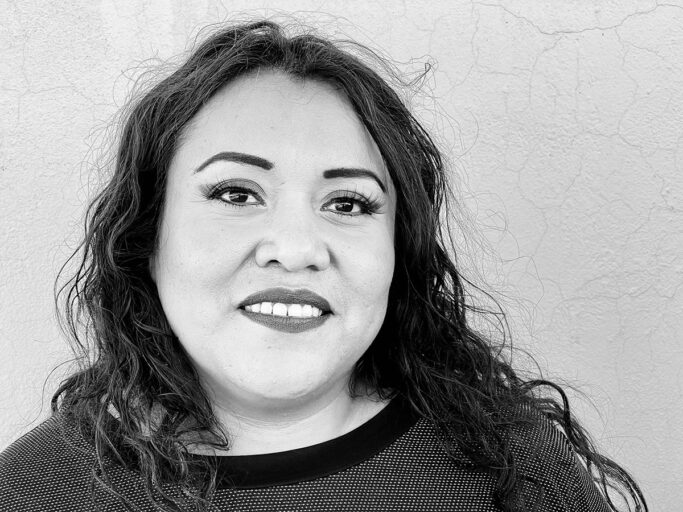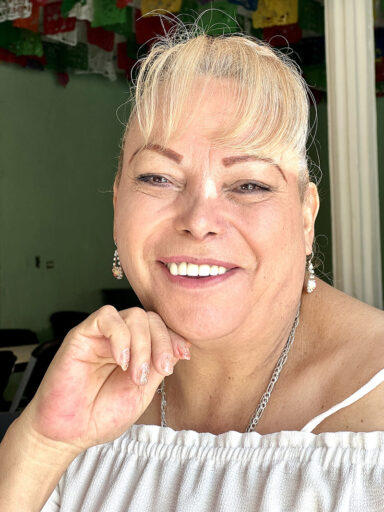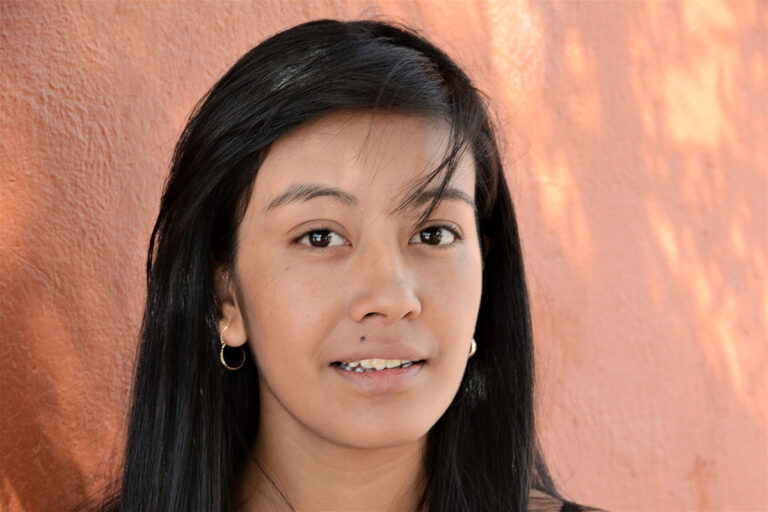
FOUR LEADERS IN JUÁREZ | Viridiana Torres, Grecia Herrera, Eva Moya y Lorena Solares. (Fotos/Morgan Smith)
Morgan Smith / Morgan-smith@comcast.net.
Haga click aquí para leer la versión en español
June 2, 2024 will be a historic day in Mexico with the almost-certain election of the country’s first woman president. The two leading candidates are former Mexico City Mayor Claudia Sheinbaum from the Morena party of the current president Andrés Manuel López Obrador (AMLO) and Senator Xóchitl Gálvez, representing an alliance of parties. Whoever wins will hopefully bring much needed additional focus on women’s issues. Having said that, I want to briefly profile four women who have already changed the lives of many in the Juárez area quietly and with little recognition.
The first is Viridiana (Viri) Torres who arrived at the mental asylum, Vision in Action about seven years ago. Although she had been in and out of several mental institutions earlier, Pastor José Antonio Galván, the founder and director of Vision in Action quickly recognized her talents and put her to work organizing their finances. She soon recognized that a key employee was stealing, and he was dismissed.
Then she became an advocate for the women patients; there are about 40 of the roughly 120 total patients. Her first step was to propose separating the men and women with dementia who had been living in the same dormitory area. With the financial help of many of our friends, we were able to construct a separate living area for these women. That was followed by a larger project to build a dormitory for 20-24 other women so that they could live without being harassed by the men. Now Viri is focused on improving medical care there.


Nurse and leader
Grecia Herrera founded a shelter for transgender migrants in November 2018. It is in a rickety looking five story building near the international bridge in the center of Juárez. The original transgender-based non-profit didn’t work out, so Respettrans is now dedicated to migrants who are awaiting asylum hearings, most of whom are women with children. What is extraordinary is that it is mostly run by the migrants themselves since Grecia has a day job as a nurse and cannot be here physically much of the time.
The migrants are an ever-changing population because they will eventually get their asylum hearings and then leave for various locations in the US. Nonetheless, the interior of Respettrans is spotless, there are no disciplinary problems, everyone is well fed, medical care can be arranged, and there are often classes for the kids so they can not only continue their schooling but also learn some English. She has helped many of the men get day jobs so they can accumulate funds for a future life in the US.
A volunteer
Respettrans depends heavily on external support and one of the key supporters is a non-profit named Dignity Mission located in Placitas, New Mexico just to the west of Albuquerque. Volunteers there led by Jack and Cheryl Farrell put together huge loads of food, clothing, medical supplies, and other key items and make deliveries by rental van every four to six weeks. Each load is about 3 tons.
Because of the impossibility of getting these vans across the border, all the items are stored in the garage of Professor Eva Moya in El Paso. She is the crucial link between the needs of Respettrans and the generosity of the Dignity Mission because she then arranges for volunteers to take these items across the border to Respettrans, carload by carload. An associate professor in the School of Social Work at the University of Texas at El Paso (UTEP), neither of her parents completed their elementary education but after starting school in Mexico, she came to El Paso, earned her degrees at UTEP including a Ph.D. in 2010. Her role is essential to the survival of Respettrans.


A teacher
“Do you miss your family?” I ask Lorena Solares, the teacher for a small school for Tarahumara kids on the westside of Juárez near Vision in Action. Her family lives in the city of Chihuahua, many miles to the south but when I asked her if she missed them, she said, “My family? This is my family.” She puts her arms around two of the Tarahumara boy students. “You know that I have been here ten years.”
For eight years I have been visiting this school, bringing fruit and yogurt to help vary their bland diets as well as needed school supplies. It’s a one room classroom with a casita next to it where Lorena lives, all enclosed by a white wall for security. The surrounding area is grim – dirt streets, houses made of patched together plywood and cardboard. Education is the only way out for these kids, but it isn’t easy since many of them only speak their Tarahumara dialect. So, they must learn not only the basics like math but Spanish as well. Without Lorena’s quiet dedication this would never be possible.
No matter what happens in next year’s Presidential elections, these four women will continue their essential work. As of now, however, their various programs receive little or no support from the Mexican government. Maybe that will change with a woman president.
You may also like:
Embracing Rest, Relaxation, and Family






otras noticias
Antisemitism Strikes Colorado’s Jewish Community
Informal hot dog sales raise concerns in Denver
16th Street fills with free events and community activities